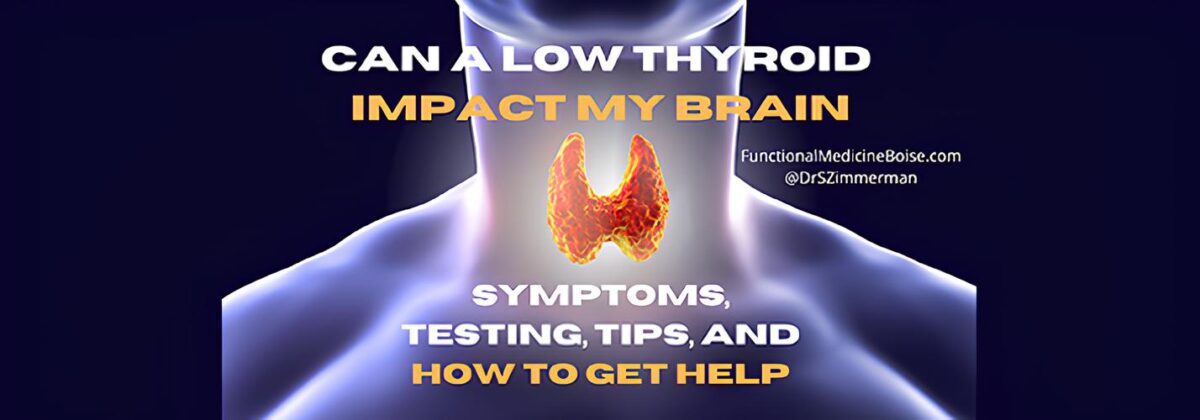Functional Medicine Brain Fog
When you hear the term brain fog, what do you think of?
- Your brain is running slow and feel like you are in a haze.
- When having conversations with friends and co-workers you seem to struggle to find the word even though it is right at the tip of your tongue.
- Maybe you just feel off and not yourself.
- You catch yourself walking into the kitchen to grab something but when you get there you forget why you went in there to start.
If so, you might be experiencing brain fog, which is a term that refers to the inability to think clearly or you just feel off.
It may persist days, months, or even years until the underlying cause has been identified. Some of these causes occur in an instant, but others you may not think of. Before we dive into what can cause brain fog, I want you to think of brain fog as inflammation, impaired connections or reduced oxygen in the brain impacting function.
HERE ARE FIVE REASONS WHY YOU ARE SUFFERING FROM BRAIN FOG
1. FOOD INTAKE
Have you ever noticed feeling tired and unable to think after eating a meal that contains gluten or dairy? Or You sit down to enjoy a big chicken sandwich and fries at lunch to only want to take a nap 30 minutes later as your brain starts shutting down.
This occurs because eating certain foods creates inflammation. Inflammatory foods lack nutrients we need to be healthy but also may block the absorption of nutrients that your brain needs to function at its best.
Research shows that lack of the following nutrients may result in brain fog : 1
- Omega 3 fatty acids (DHA)
- Flavonoids
- Curcumin
- B vitamins
- Vitamin D
- Choline
- Vitamins A, C, and E
- Zinc
- Selenium
- Copper
- Iron
- Magnesium
While saturated fat has been shown to promote cognitive decline, omega 3 fatty acids help prevent it. So, try eating more fish and less processed red meat.
Here are some other foods to add to your diet to reduce brain fog:
- Fatty fish
- Flax seeds
- Krill
- Chia seeds
- Walnuts
- Unprocessed cocoa
- Green tea
- Kiwi
- Avocado
- Asparagus
- Mushrooms
- Green, leafy vegetables
- Citrus fruits
- Oysters
2. GUT INFLAMMATION.
Is your brain fog accompanied by digestive problems like constipation, bloating, diarrhea, or gas? How about dry skin, bad breath, acne, and weight gain around your waist and hips?
If so, that’s a sign of gut inflammation and it’s likely the reason why you are unable to think after eating certain inflammatory foods, such as crackers, pasta, or cheese.
So, why and how does this happen?
It’s because your gut and brain are connected by the vagus nerve, which runs from your brain to the stomach. It brings information to your stomach, but also brings information back to the brain.
When you eat inflammatory foods (gluten, dairy, refined sugars, processed grains, or candy), it causes your gut to send “distress” signals to your brain, affecting your thought process.
However, when your gut is healthy and working properly, it allows you to think more clearly and have better memory recall by properly stimulating the vagus nerve.
Additionally, your gut produces many hormones and neurotransmitters that control weight, appetite, and mood.
- 85% of serotonin is produced in the gut and is important for happiness
- Dopamine is responsible for reward and motivation
Here’s how to restore gut health:
- Eliminate refined sugars and processed foods from your diet (pretzels, crackers candy, soda, packaged snacks, and bread)
- Avoid gluten, dairy, refined sugars, and grains
- Supplement with probiotics
- Eat more fresh fruits and vegetables
- Focus on eating minimally processed foods
- Get regular exercise
- Focus on getting eight hours of sleep each night
3. STRESS
Has a highly stressful conversation with someone immediately made you feel like you forgot how to speak mid-conversation? That’s stress.
Maybe the stress carries with you the rest of the day and you develop a headache, dizziness, or poor concentration.
Research shows that high cortisol, stress chemical, levels shrink parts of the brain that are responsible for learning and memory . It’s also linked to premature brain aging. 2
Having a healthy outlet for stress is important for proper brain function. The old mindset of grin and bear it is detrimental to our brain health.
Here are some ways help with stress and bring down cortisol levels:
- Exercise regularly
- Practice breathing exercises
- Try yoga or meditation
- Focus on improving your quality of sleep
- Eat an anti-inflammatory diet
- Avoid refined sugar and processed foods
- Use your vacation days
4. INSUFFICIENT QUANTITY OR QUALITY OF SLEEP
Do you feel like you can’t think at all in the morning after a restless night of sleep? Do you find that easy tasks like getting your kid’s backpack ready is impossible?
Maybe when you try to go sleep your mind starts racing and you need Benadryl or melatonin to fall asleep an hour or two later.
Sleep is essential for brain function. During sleep, your brain “cleans” itself by removing toxins and waste that negatively impact cognitive function and help make morning tasks easier. If you don’t sleep this is like the garbage truck not showing up and no one wants that.
Here are some tips for getting better sleep:
- Set a bedtime routine
- Sun exposure
- Go to bed and wake up at the same time daily
- Reduce exposure to light before bed
- Keep your room cool and dark
- Eat a light dinner based around fats and proteins with low carbs
- Avoid drinking too close to bedtime
- Limit screen time
- Blue light filter
5. CONCUSSION
You may think a concussion isn’t a big deal, but did you know that 50 percent of people who suffer a concussion have brain fog years later, even if you don’t have it right away ? 3
A concussion is the most common form of traumatic brain injury. Unfortunately many suffer a concussion but never receive a proper diagnosis or do not know that it can impact them years later.
You can suffer a concussion without hitting your head even from a rapid movement of your head forward and back. Common causes of concussion are car accidents, sports injuries, slips and falls, and blows to the head.
Although the incident might not seem a big deal at the time, some research suggests that nearly 50% will have long-lasting symptoms due to inflammatory changes that occurred when you became injured. 4
Symptoms of a concussion impact cognition, physical, and emotions:
- Feeling like you’re moving slowly
- Difficulty concentrating and remembering things
- Inability to focus
- Frequent headaches
- Sensitivity to light and noise
- Sleep disturbances
- Balance problems
- Fatigue
- Vision changes, fuzzy or blurry vision
- Anxiety or mood fluctuations
LAST THOUGHTS
So what exactly is brain fog, well it is a description that individuals use when their brain isn’t processing correctly or they are in a haze. At a cellular level this can occur due to inflammation, reduced oxygen, or impaired connections in the brain.
There are many causes of brain fog and we didn’t even cover them all. For beginners, don’t look past the role of nutrition, gut health, stress, sleep, and concussions as contributing factors to brain fog.
It is okay, you are likely overwhelmed at the thought of how many different things may contribute to your brain fog and would like expert help.
You may be wondering how we evaluate and address the cause of your brain fog. We utilize The BMB Method (Brain, Mind, & Body) that has been refined over the past 9 years. This allows us to look where others aren’t, as well as view each person as an individual by:
- Evaluating the brain looking at function using eye movements, balance, and brain waves.
- Evaluating the mind reviewing past traumas and the subconscious programming that prevents you from success in life.
- Identifying how the different systems in the body are functioning using symptoms and lab testing.
By using The BMB Method we are able to provide answers and solutions when other programs have failed. If you are ready to try a new approach to these symptoms that are robbing you of your life then request your health strategy session today.
CITATIONS
- Gómez-Pinilla F. (2008). Brain foods: the effects of nutrients on brain function. Nature reviews. Neuroscience, 9(7), 568–578. https://doi.org/10.1038/nrn2421
- Hiploylee, C., Dufort, P. A., Davis, H. S., Wennberg, R. A., Tartaglia, M. C., Mikulis, D., Hazrati, L. N., & Tator, C. H. (2017). Longitudinal Study of Postconcussion Syndrome: Not Everyone Recovers. Journal of neurotrauma, 34(8), 1511–1523. https://doi.org/10.1089/neu.2016.4677
- Theadom, A., Parag, V., Dowell, T., McPherson, K., Starkey, N., Barker-Collo, S., … BIONIC Research Group (2016). Persistent problems 1 year after mild traumatic brain injury: a longitudinal population study in New Zealand. The British journal of general practice : the journal of the Royal College of General Practitioners, 66(642), e16–e23. https://doi:10.3399/bjgp16X683161









